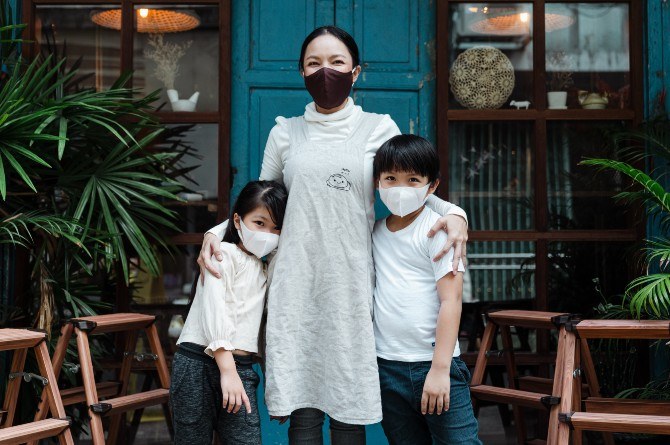The Covid-19 pandemic has been mutating and that spells trouble for anyone and anything that comes in touch with it.
What can you read in this article?
- What is the Delta Variant?
- How does the Delta Variant spread?
- Is the Delta Variant more dangerous?
- How can you safeguard children from the Delta Variant?
The Delta variant has turned out to be more transmissible than any other Covid-19 strains so far, which means you need to be more cautious than ever when it comes to attending social gatherings, crowded spaces, or even public events.
Essentially, do not let your mask drop down and always carry a sanitizer.
The Delta variant also comes at a time when students are back to school and presently the most vulnerable with no vaccine for them yet. That does leave them exposed and it is all the more reason for you to take utmost precaution.
But you can only do that once you understand how it affects children. So, what are the first signs of delta variant and how is it different? Here’s a quick guide to get you up to speed.
What is the Delta Variant?

Image source: iStock
The first signs of delta variant were identified in India before making its way to other parts of the world including the UK and the US. It’s the latter though that has seen the maximum number of cases reported from several states.
How does the Delta Variant spread?
The Delta variant has proven to be highly contagious and some experts believe it’s twice as transmissible as the standard Covid-19 infection, and about 40-60 percent more transmissible than the Alpha variant.
Experts suggest that the virus can spread in a matter of seconds from one person to another when indoors and not wearing a mask.
While they believe the outdoors are safer in comparison, there’s no base level yet to compare the two.
Leaked US Centers For Disease Control (CDC) documents recently revealed that Delta is as contagious as chickenpox. However, there has not been any official confirmation on the same yet.
Is the Delta Variant more dangerous?
The first signs of the Delta variant have been shown to spread at a faster rate in the US over other Covid-19 variants. But there’s not enough evidence to confirm if it’s deadlier than the other strains.
A study in Scotland found that the Delta variant can lead to hospitalization at twice the rate of the Alpha variant. While this may suggest that it has a more adverse effect on the immune system, researchers are yet to determine the exact details of the same.
However, some researchers do suggest that it more gravely affects children.
Fatherly quotes Stanley Spinner, MD, Chief Medical Officer and Vice President of Texas Children’s Pediatrics and Texas Children’s Urgent Care, who says, “The evidence seems to be tipping that [Delta’s] certainly causing more severe illness in children, due to the numbers of kids being hospitalized, more so than we’d ever seen previously during the pandemic.”
Like the Covid-19 infection last year, the Delta variant has been successful in crowding hospitals once again. It hasn’t specifically caused a rise in the number of deaths though.
Do vaccines stand a chance against the Delta Variant?
The Covid-19 vaccines were developed in record time. This does mean that they did not have the chance to take into account the new virus strains.
Nevertheless, the vaccines have been effective enough at stopping infection and severe diseases caused by the Delta strain.
However, researchers acknowledge that vaccines have been more effective at stopping strains of the virus before, in comparison.
- The Pfizer vaccine is 88 per cent effective against symptomatic infection from the Delta variant and 96 per cent effective at preventing severe disease.
- The Moderna vaccine is 72 percent effective at preventing symptomatic disease and 96 percent effective against severe disease.
- The Johnson & Johnson vaccine has been found to be 85 percent effective against severe diseases. But it’s also substantially less effective against the Delta strain, a study suggests.
However, a peer-review of the study needs to happen. It also used tests on blood samples, not on real people.
Scotland researchers also found out that the Pfizer and AstraZeneca vaccines were less effective against the Delta strain over the Alpha strain.
READ MORE:
5 sintomas ng bagong DELTA variant na iba sa karaniwang sintomas ng COVID-19
Nanay ng namatayan ng 1-year-old na anak: “‘Wag balewalain ang COVID dahil totoong-totoo siya”
Tatay na hindi naniniwala sa COVID, pumanaw ang anak dahil sa COVID
What’s the infection rate among those vaccinated?
While the first signs of Delta variant is a higher chance of infection, fully vaccinated people have shown better resistance.
A Kaiser Family Foundation analysis of the Covid-19 data in the US suggests, “The data reported from these states indicate that breakthrough cases, hospitalizations, and deaths are extremely rare events among those who are fully vaccinated against COVID-19.”
The foundation further said, “The rate of breakthrough cases reported among those fully vaccinated is well below 1% percent in all reporting states, ranging from 0.01 percent in Connecticut to 0.29 percent in Alaska.”
A tweet from American FDA commissioner Scott Gottlieb read, “While infections (and transmission) can still occur, the vaccines work very well. In CDC’s data, they showed vaccinated people had a 25-fold reduction in risk of death, a 25-fold reduction in risk of hospitalization, and an 8-fold reduction in risk of disease.”
This clears up that vaccinations may be less effective on the Delta variant. But they do give a fighting chance to fully vaccinated people. In contrast, the number of cases in the US has been higher where the vaccination rates are lower.
The World Health Organisation (WHO) says that 132 countries have been affected by the Delta variant. The US has seen a dominant rise in the number of infections due to the Delta variant. It makes up for over 90 percent of the new Covid-19 cases in the region.
How can you safeguard children from the Delta Variant?

Image Source: Pexels
Irrespective of which part of the world you are, there is a possibility of the Delta variant finding its way. As parents, you need to be concerned about your children who remain unvaccinated for now.
Meanwhile, you need to make sure that you’ve taken both doses of the vaccine yourself.
The Delta variant does not particularly attack kids. It’s just more transmissible and that makes kids more susceptible to catching an infection.
“I’m not concerned about my children or other unvaccinated children who are around fully vaccinated people, but I’m very concerned about unvaccinated people being around others who are also unvaccinated – whether they’re children or adults,” CNN quoted Leana Wen, an emergency physician and a professor of health policy and management at the George Washington University Milken Institute School of Public Health.
Kids also risk becoming spreaders of the Delta variant. This can increase the need for pediatric beds this time in hospitals when compared to the previous variants.
While you can let kids play outdoors and without masks, socializing with unvaccinated people is best avoidable.
Republished with permission from theAsianparent Singapore
 Money Tips
Money Tips Building a BakuNation
Building a BakuNation Becoming a Parent
Becoming a Parent Ages & Stages
Ages & Stages Parenting
Parenting Health & Wellness
Health & Wellness Education
Education Lifestyle Section
Lifestyle Section Become a VIP
Become a VIP Press Room
Press Room TAP Recommends
TAP Recommends Shopping
Shopping Community
Community Rewards
Rewards VIP Parents
VIP Parents
